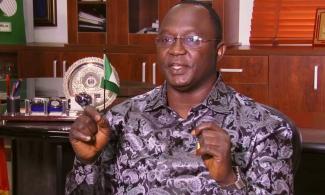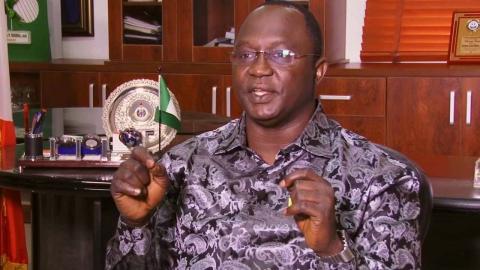
The declaration came as the labour movement and its civil society allies meet in Lagos today to decide the next line of action on the suspension of negotiations by government.

The Nigeria Labour Congress (NLC) is not ruling out strike to reopen stalled negotiations on its demand for better wages, NLC president, Ayuba Wabba, told The Guardian in an exclusive interview yesterday.
“If it becomes necessary to declare a strike action over the minimum wage imbroglio, we would do that.
But it will be communicated appropriately to the rank and file after the meeting of the organised labour,” he said.
The declaration came as the labour movement and its civil society allies meet in Lagos today to decide the next line of action on the suspension of negotiations by government.
Wabba accused the Federal Government of employing delay tactics on the implementation of a new minimum wage for the country.
According to him, the committees that worked on the figure had reached agreement on average, and main and medium figures for debate, before Minister of Labour and Employment Chris Ngige suddenly adjourned the meeting.
The labour movement and its allies have not received any communication from the government and are yet to see any concrete action taken to reconvene the meeting, he said.
He noted that the three committees: the one working on the proposed law that would replace the 2011 Act, the one working on the main report, and the one working on the figure, have all concluded their reports.
“Both Conventions 98 and 131 that relate directly to the issue of minimum wage have not been violated by labour in the negotiation processes.
The issue of adjourning a meeting sine die on a day that the report of that collective bargaining is supposed to be concluded is indeed a violation of the principle of tripartism.
This is because no one party in the tripartite process can unilaterally impose a decision on the other.
“This negates an agreement that had been reached. The committee had a work plan within which to conclude its assignment on or before August 21, 2018.
We had to shift the date because it fell on a public holiday after the tripartite agreement,” Wabba explained.
He said that the much-touted inability of some states to pay the current N18,000 minimum wage is the result of misplaced priority.
According to him, “In the last three months, revenues have so much increased from around N400 billion to about N1trillion.
Yet, we see some state governments that are still unable to pay salaries. If states like Yobe, Katsina and Jigawa can pay salaries and gratuity, why can’t most states?”
Meanwhile, the group managing director of the Nigerian National Petroleum Corporation (NNPC), Maikanti Baru, yesterday urged oil workers under the auspices of the National Union of Petroleum and Natural Gas Workers (NUPENG) and the Petroleum and Natural Gas Senior Staff Association of Nigeria (PENGASSAN) to halt their planned industrial action.
The groups had threatened to embark on strike over a labour dispute involving the management of Chevron Nigeria Limited (CNL).
Last Wednesday, they put members on red alert, worried that new manpower services contracts might not serve the interest of their members.
CNL had disclosed that the contracts would expire by the end of October 2018.
Baru allayed the concerns of consumers of petroleum products nationwide over possible hiccups in supply due to the oil workers’ ultimatum.
The NNPC holds adequate storage of petroleum products to take care of the national demand, he assured.
He urged the groups not to do anything that would disrupt the industrial harmony that has pervaded the sector, expressing optimism that the dispute would be settled amicably.
This came as the Edo State chapter of the Nigeria Union of Teachers (NUT) faulted the state government’s Edobest Programme, describing it as a negation of the union’s regulations.
The union had since August threatened to embark on an industrial action over alleged poor welfare conditions. This plan was, however, shelved till the end of September.
The disclosure was contained in a protest letter dated September 19, signed by the state chairman, Pius Okhueleigbe; secretary, Moni Mike Modesty Itua; and the state chairman of the Association of Primary School Head Teachers of Nigeria (AOPSHON), Segun Ogene.
Addressed to the executive chairman of the State Universal Basic Education Board, Joan Oviawe, the union said: “It has been revealed that most of the school children do not take breakfasts before coming to school.
Also, most parents do not provide food or money for snacks for their children due to abject poverty.
Consequently, the children often fall ill when kept beyond their closing hour of 1.45 pm.
“Also, they lose total concentration during extra time because they have attained the learning plateau.
As a result, teachers are made to run from pillar to post, trying to remedy the bad situation.”
The union added: “It is worth mentioning that the Edo State government or the federal government of Nigeria has not commenced the much-awaited school feeding programme in our state, which perhaps might have provided succour to the pupils.”